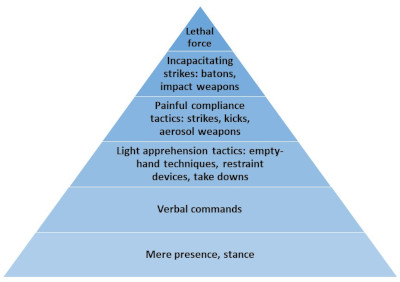Abuse Tactics
Abusive officers corrupt their legitimate police training, skills, and authority into public misconduct and private abuse. In addition to employing the same tactics that civilian abusers use, officers who batter typically use tactics of control that they have acquired through their professional training. These include exaggerated forms of verbal, emotional, psychological, and physical abuse. Officers are professionally trained to get and keep people and situations under control. When a person challenges police authority, the police have the power to physically restrain, to use force when necessary, and to deprive a person of their freedom. This training can add additional levels of sophistication to abusive behavior and tactics.
Learn about these abuse tactics:

- Authoritative presence
- Isolation
- Verbal abuse
- Emotional abuse
- Surveillance
- Deception | Lying | Manipulation
- Interrogation
- Financial abuse
- Sexual abuse
- Physical violence
- Weapons | Death threats | Suicide
- Preemptive tactics | Setting you up
Depending on your situation, you may feel certain that your abuser would never use police control tactics against you. Or you may be familiar with the tactics because he has already used them. Because the severity of abuse tends to escalate over time, it may be smart to anticipate what your abuser might do in the future.
Authoritative Presence

The mere presence of an officer can be intimidating enough to cause people to adjust their behavior. For example, what do you do when you see a squad car in your rearview mirror? Police officers learn to establish their authority through their presence and appearance. The police uniform, squad car, badge, gun, and military-style weapons and equipment are the universal symbols of power and authority that set them apart from others. Citizens recognize that those in uniform have the power to deprive them of their civil rights and personal freedom, and to use deadly force against them. Their fear of police is not based solely on fear of individual officers, it is based on fear of the institutional power that individual officers wield.
Officers learn to use their body language to intimidate and manipulate people: simply moving or standing a certain way can elicit fear or panic. They are trained how to use their body to disarm attackers and to control physical confrontations when they have no weapons other than their hands. Police are also trained to use their voice to gain control of people. Different tones of voice convey increasing levels of control: from a polite request to an order, to an ultimatum or a threat. As with body language, a voice can solicit trust or inspire fear.
Cops' wives and girlfriends talk about the change in their partner when he puts on the police uniform. A transformation takes place, he's now 'The Man' — superior and powerful. They describe changes in posture, facial expression, and tone of voice. He exudes a "don't mess with me" arrogance. He's not just a man anymore, he is a cop. The gun and the badge give him the institutional power that supports whatever he wants to do, or whatever he wants others to do.
Your partner knows he doesn't have to hit, slap, kick, choke, or otherwise physically abuse you to control you. He knows he'd be a fool to do anything that you could use to get him into trouble on the job. He knows that non-physical forms of abuse such as psychological, verbal, and emotional abuse — all effective means of control — are next to impossible for you to prove and much easier for him to deny.
It's important for you to recognize that when a cop uses his professional tactics he is intentional and calculated; he is fully aware of their impact. When he walks through the front door of your home with the same mind-set he has on the street, he can use his acquired command presence, voice, and "The Look" along with his other skills to intimidate and control you. He can do whatever it takes to remind you and your kids that he is the one in charge.
Go to indexIsolation
Cops isolate people when they interview or interrogate them because they understand the psychological impact of depriving people of their freedom to interact with others. Isolation makes it easy for the officer to establish who is in control.
Your partner may emphasize that he alone cares for you and knows what is best for you. He may tell you that people outside the police family don't understand cops' lifestyles and values and he expects you to keep your private lives private. He may frequently remind you that you are a police officer's wife and therefore with whom you associate reflects on both him and his department. He may tell you that since you too are a member of the police family, you have an obligation to present an untarnished image of the family to the community.
Most abusers are jealous and possessive. Your abuser may perceive your friends and family as a threat to his power over you. He knows that people who know and love you might notice a change in you and identify what he claims is protectiveness as manipulation and control. If he can keep you from spending time with them, he becomes your only source of affection and support. If he can't accomplish that, he will find ways to undermine your relationships with them. He may intimidate and frighten them so they will be afraid to interfere. Or he may do the opposite by charming them into believing that he's a wonderful guy who would never hurt you, so if you ever tell them about his abuse, they won't believe you. He may do all this very gradually and subtly so that you're not aware of what is happening.
Though he does not want you to socialize with outsiders, he doesn't want you to socialize with other officers' wives, either. He may expect you to attend work-related events occasionally but, of course, he will be there with you. He expects you to portray the image of a perfectly happy wife and mother (even though he feels free to make derogatory or humiliating remarks about you and/or your marriage).
Once he controls your social interactions, he has more liberty to regulate your experience and to define your reality. He may gaslight you by gradually convincing you that your own perceptions, thoughts, and intuitions are unreliable. He may insist that things didn't happen the way you remember, that he didn't say nor do what you claim he did. He confuses you with his lies and manipulations until you no longer trust your own sense of reality. He tells you that you're stupid or crazy when you defend your own thoughts and feelings. Your isolation deprives you of anyone else's reflection of who you are, and so you may begin to believe that what he says about you is true.
Go to indexVerbal Abuse

Cops use language to establish and/or maintain dominant-submissive relationships. They use words to humiliate, embarrass, discredit, dehumanize, and devalue people. They also use words to provoke a confrontation that can justify the use of force and/or an arrest.
Name-calling is a basic form of verbal abuse, and it is painful to experience. Other forms of verbal abuse are insidious and quite subtle. Criticizing what you do, what you believe, whom you care about can be devastating. He may criticize you as a person, making accusations that you are not who you appeared to be. Or he tells you that you are a terrible wife, an inadequate lover, a bad mother, an unworthy friend, thereby attacking your deepest image of yourself. You live in dread of the moment when his violent words turn into violent actions.
What he says and how he says it can be as effective as a weapon. He uses his command voice that he uses on-duty. When his face changes and he gets that look in his eyes and screams at you, you are terrified, and you say or do whatever you think he wants you to. He can achieve his goal without raising a hand to you. Many victims have quoted what their abusers say during such tirades. It turns out that most police abusers say the same things, word for word. These are some of their most common lines...
| When he says... | He means... |
|---|---|
| I'm not going to argue with you. | It's going to be my way; I don't care what you think. |
| Don't make me do this. When will you learn to listen to me? | It's all up to you. I wouldn't have to do this if you'd just listen. |
| It's over when I say it's over. | I'm in control. |
| You don't know who you're up against. I'll win, no matter what it takes. | I'll have the last word. |
| Nothing satisfies you. You're a bitch just like the rest of them. | I won't even try to make this work. No woman is worth it. |
| We don't have a problem...you have a problem. | You go to counseling, you're the one who needs help. |
| No one else would put up with your shit like I do. | I'm the victim here. |
| You knew I was a cop when you met me. | Don't start complaining now. |
| You've got it made. Other cops cheat on their wives, drink, do drugs. You're lucky to have me. | I'm a prize and you don't know enough to appreciate me. |
| You don't know a thing about the real world. You'd never survive without me. You were nothing when you met me. Everything you have is because of me. | You're stupid and naïve. You should be grateful that I rescued you. |
| This is my house, my car, my money, these are my kids." | Don't even think about taking anything or anybody with you if you leave me. |
| You don't know what abuse is. I'll take you to the morgue and show you what abuse is. | What I did to you is nothing. You're still alive, so consider yourself lucky. |
| I didn't do that — you bruise easy. | I didn't hit you that hard. You're exaggerating. |
| It's all in your head. You're crazy. | You're imagining things; you're making things up. |
| If you just hadn't pushed me (...hadn't said that; ...hadn't done that) I wouldn't have had to hit you. | It's all your fault and you know better. |
| The assholes on the street treat me with more respect than you do. I don't take that shit from anybody, especially you. | You're more worthless than the losers on the street. |
| I'll kill you if you fuck with my job. I could kill you and no one would ever prove it. | Don't even think about going for help. I can get away with murder. |
| Go ahead, call the cops. Who do you think they'll believe? | I am the police, and your word means nothing. |
| Cops stick together. They'll say what I tell them to say. | The truth is irrelevant. |
| Call the cops and I'll lose my fucking job. Is that what you want? | You'll have no financial support. |
| If I lose my job, you're going down with me. | We're in this together. |
| Forget the past. Why can't you let anything go? | We can't move on if you keep bringing up the past. |
Go to index
Emotional Abuse

Cops learn that humiliating, degrading, embarrassing, and ridiculing people wears them down emotionally and psychologically. They call suspects names and tell them that they are worthless and stupid. They remind them that their freedom, safety, and their lives are at the mercy of the police.
A police officer's training adds extra levels of sophistication to his tactics and style of emotional and psychological abuse in your relationship. Tactics such as constantly criticizing you, calling you names, telling you that you are worthless and would be nothing without him, threatening to leave you, setting you up in no-win situations, using your kids as weapons against you, and undermining your parenting style are all emotionally abusive and intended to make you feel inferior.
He keeps you emotionally off balance by being loving and gentle with you one moment, and then hateful and violent the next — a version of the good cop/bad cop routine. He demonstrates erratic moods and behaviors just to keep your anxiety level up. You find yourself walking on eggshells or expending great amounts of time and energy to avoid upsetting him. You find yourself emotionally hanging on by a thread and perhaps turning to drugs or alcohol to help you cope. When things seem hopeless, you might think that suicide is your only escape. These are warnings signs that he is manipulating you into hurting yourself. It is time to take steps toward regaining control of your life.
Go to indexSurveillance
Police sometimes let suspects know that they are under physical and electronic surveillance because they know the psychological impact of being watched at all times. Surveillance makes a suspect anxious, wondering when and where the cops are watching, agonizing over what information they have. The uncertainty as to when and where the cops are watching and what they may do leads a suspect to internalize the control and modify usual behavior.
If your batterer suspects that you are having an affair or hiding anything from him, he might use his police training and equipment to keep you under surveillance. Stalking you physically or electronically robs you of your sense of privacy and control over your life. He might let you know when you return home that he knows where you've been and whom you've been with. He might repeat things you've confided to friends in (what you thought were) private phone conversations or other correspondence. He tells you that he knows these things because he knows you so well, but you come to suspect that he is spying on you. You may find yourself altering your behavior based upon the possibility that he is watching, thus internalizing and increasing his control over you.
If he's a patrol officer or a detective he has a lot of freedom, mobility, and flexibility while he's on duty. He may randomly stop by your home, workplace, or school. He may enlist the help of other officers to keep an eye on you and report back to him. You might see unmarked police vehicles driving past or parked outside your house at odd hours. You may not allow friends to visit you at home for fear that the cops might run their license plates to get information about whom you're seeing socially. You may constantly wonder if you're being sensibly cautious or if you're getting paranoid.
It is critically important that you educate yourself on the many ways that abusers can surveil and stalk their victims. For excellent information related to cyberstalking and technology, see Abuse Using Technology | WomensLaw.org
Go to indexDeception, Lying, and Manipulation

Some types of police work, such as undercover investigations and suspect interrogation require officers to convince people that what they're hearing from the cops is true, even when it contradicts their own perception of reality. It's essential that officers be adept at twisting the truth to effectively achieve this type of manipulation. Their personal safety may depend on their ability to look others in the eye and lie convincingly. They develop the ability to hide their own reactions, thoughts, and feelings, even under tremendous stress. It is likely that a police officer experiences a real sense of power in being able to get people to believe whatever he tells them to believe.
Lying is a tremendously powerful means for an abuser to gain and maintain control over an intimate partner. He is able to define your reality by choosing whatever information he wants you to have and presenting it to you as objective, logical, and reliable. He lies to convince you that your own perceptions, the evidence of your own senses, thoughts, and intuitions are purely subjective, emotional, and unreliable. He manipulates you until you no longer trust yourself. If you defend your own perceptions or knowledge, he tells you that you are 'crazy' and eventually you may start wondering whether you really are. This increases your sense of isolation and his control.
If you ever confront your abuser with evidence that he is lying or keeping things from you, he may justify his actions by saying he lied to protect you or because he knew that you just wouldn't understand. He may be furious at you for having discovered his deception and accuse you of invading his privacy. Or he may pretend he's feeling hurt and betrayed by your lack of trust.
Officers are not accustomed to answering to anyone; people answer to them. A lot of male officers have extramarital affairs, keep private cell phones, maintain secret bank accounts, rent post office boxes, and own property that their wives don't know about. Some gamble, purchase sexual services, use or deal drugs, participate in buying and selling confiscated goods — all without any expectation that they will have to explain it to their wives or partners. If you stumble upon evidence of any of his secrets, he will most likely blame you for the consequences of your discovery.
Go to indexInterrogation
The tactic of interrogation is used when police believe that a suspect is trying to conceal something from them. The interrogator establishes control by breaking down the suspect through isolation and withholding access to food, sleep, and bathroom breaks during a period of ceaseless questioning. He induces stress by accusing the suspect of the deed and relating the severe consequences certain to follow. By being alternately friendly and hostile, he can keep the suspect emotionally and mentally off balance. This continues until the officer obtains a confession.
Over time, cops come to believe that everyone lies to them. While this may serve them on the job, it's destructive when they become suspicious of their spouses and children. They see lying as a form of disrespect and are determined to get to the truth through verbal intimidation, manipulation, and interrogation. If your abuser suspects that you are hiding something from him, he'll become obsessed with finding out the details. He applies the interrogation skills he uses on the job and isolates you in a room you cannot easily escape, like the bathroom or bedroom. He'll accuse you of whatever it is he has imagined that you are doing, then go on and on firing questions at you. When you try to answer, he'll refuse to listen to what you have to say or insist that you are lying to him. He may keep this up for hours, until out of sheer exhaustion or frustration you end up confessing to something that you didn't do just to put an end to the grueling ordeal.
You feel like a suspect in your own home:
- He interrogates you about any suspicions he may have concerning finances, infidelity, or friendships.
- He stands over you in uniform using his command presence and demands to know where you have been.
- He demands to know whom you were talking/texting to on the phone.
- He demands that you look at him while he is talking.
- He blocks the doorway so you cannot exit the room without physically touching him should you refuse to answer his questions.
- He continues to barrage you with questions.
- He raises his voice in disbelief at your answers to his questions.
- He slams his fist on the wall or table to intimidate you.
- He rips the telephone from the wall or smashes your cell phone so you cannot summon help.
- Despite your pleading, he refuses to allow you to leave until he is done with his questioning.
- If you attempt to push past him, the physical altercation begins. In his mind, he can justify his behavior because you touched him first. He was 'merely' trying to talk to you.
- He has total control of the situation. If you answer his questions, you could be in more danger. If you do not answer his questions, the same is true.
Financial Abuse

Your abuser may control all the money in the family and give you only an allowance, which he demands that you then account for all expenditures. Though you may handle the money, pay the household bills, and dole out the daily allowance for the kids' expenses, you may have no idea how much money your partner actually makes. He might forbid you from having any personal bank or credit accounts, claiming that you have what you need and the rest is up to him. You may know that he has investments but not know the details. He may assure you that whatever he is saving is "for both of us." Or, he might be heavily in debt about which you know nothing. He may expect you to sign joint income tax forms without allowing you to review them. Should you inquire, he accuses you of not trusting him or simply that it's none of your business how much income or taxes he reports.
Other forms of financial abuse include forbidding you from seeking or getting a job or, if you do work, he might...
- Sabotage opportunities for career advancement (additional training, responsibilities, hours);
- Hide or destroy work-related clothing, documents, equipment you use;
- Physically batter you prior to an important meeting or interview;
- Show up unannounced at your workplace and demand interaction with you and/or other employees;
- Prevent your participation in volunteer activities, employee events;
- Damage your reputation and reliability by forcing you to take unplanned leave, excessive sick/personal time;
- Forbid you to accept assignments which require travel or working off-site;
- If you work at home, interfere with your home office by scheduling home repairs during work hours, demanding that you take care of the house, kids, and pets.
If you have left the abuser, he may refuse to pay child support or manipulate the divorce terms by hiding or not disclosing assets. Some abusers misuse their access to restricted data and confidential financial records to ruin their victim's credit, falsify property or inheritance records, or to allege misuse of benefits or fraudulent insurance claims.
Go to indexSexual Abuse
On-duty police sexual assault is the second most common complaint of police misconduct, making many women fear sexual assault by a cop more than they fear sexual assault by a stranger. Police-perpetrated sexual abuse takes place on a continuum ranging from verbal harassment to rape and murder. Unsupervised patrol shifts afford cops ample opportunity to engage in sexual misconduct and crime. Sexual misconduct while on duty includes:
- Voyeuristic actions.
- Stopping female drivers for sexually motivated reasons.
- Checking back with female crime victims for non-law enforcement reasons.
- Making sexual comments to passersby, or during traffic or street stops.
- Sexual comments or inappropriate touching while conducting searches, strip searches, or while a person is in police custody (women refer to this as "stop and grope").
- Extortion of sexual favors in exchange for not ticketing or not arresting a person.
- Forcible sexual conduct, including oral sex and rape.
Research shows that police target women or gender-nonconforming people who are powerless to hold them accountable. They know that even if a person dares to report a sexual assault, they have little or no credibility in the system. Predatory cops typically target women of color or transgender individuals whom they perceive as being sex workers, trafficking victims, homeless women, women involved in the drug trade, those who have a history with the police and/or criminal records, LGBTQ+ people, teenagers, young women, and undocumented immigrants. Undercover cops infiltrate sex workers' places of work and extort their services in exchange for not busting them. For all these people, police present as great a danger as random assailants, their pimps, or their customers. There is nowhere for them to turn when their assailants are protected by a badge.
There are no statistics, of course, that show how many cops who sexually assault women on-duty also sexually assault their intimate partners, but we do know that both are largely underreported. Many victims of police domestic violence report that their abusers are sexually insatiable. Your abuser might expect frequent sex on demand. He might let you know that if you don't agree to have sex whenever or however he wants, you will be responsible for him going elsewhere for it. He assures you there are plenty of women out there who can't resist a man in uniform. While that may be true, there are also plenty of women who cannot, without fear of arrest, rape, or murder refuse a man with a gun and a badge.
All sexual relations that occur within the context of domestic violence (whether the violence is emotional, verbal, or physical) are forms of sexual abuse. If you submit to sex because you are afraid of what he'll do if you refuse, it is time to acknowledge that he is coercing you. Some of the many types of sexual abuse include refusing to wear a condom, forcing you to have unprotected sex, exposing you to a sexually transmitted infection, sabotaging your means of contraception, and in any way curtailing your reproductive choice. Forcing you to continue a pregnancy that you wish to terminate is a way to maintain power and control over your life forever.
Not surprisingly, many batterers are heavy consumers of violent pornography. Internet availability has normalized porn, and many have come to accept it as a guy thing right up there with drinking and sports. They overlook the fact that porn dehumanizes women and reduces them to sex objects. If your abuser demands that you watch porn with him against your wishes and expects you to perform acts you are uncomfortable with, this is sexual abuse. If he claims that he needs you to stage a violent struggle and a rape to get sexually aroused, you are in danger.
Rape is a common type of abuse experienced in domestic violence situations. If your abuser demands sex after having battered you, it is an expression of his intense desire to punish, humiliate, degrade, and/or retaliate against you. Rape is the vehicle. If there has been no prior physical abuse, a rape may be more motivated by a specific sexual grievance, such as your refusal to have sex on demand. He might use enough force to get you to submit but not enough to cause severe injury, so he denies it is 'real' rape. He is motivated by a desire to assert power, to establish control, and/or to teach you a lesson. Accusing you of having sex with someone else might be a prelude to a rape in which he reestablishes his ownership of your body.
Victims of marital rape suffer long-term trauma due to the profound betrayal they experience. The fact that someone you loved and trusted violated you in such an intimate way destroys your ability to trust. You may have lived for months or years suffering never-ending anxiety about when the next forced sex episode might occur. You may experience chronic terror, emotional numbing, involuntary panics, flashbacks, and repetitive nightmares. One victim summarized, "When you are raped by a stranger you have to live with a frightening memory. When you are raped by your husband you have to live with your rapist."
Go to indexPhysical Violence

Your abuser's police training taught him that the suspect's behavior determines whether the officer uses force. He has been taught that if a suspect resists arrest, tries to escape, assaults or threatens an officer, shows disrespect by talking back or questioning his authority, the suspect forces the officer's hand. Officers have legal authority to use only the amount of force necessary to gain control of a suspect. His training taught him to employ force along a continuum ranging from mild restraint to techniques that inflict great pain yet leave no bruises or broken bones; to use his hands, elbows, legs, and knees as weapons; and to deploy lethal force. When citizens accuse officers of using excessive force, department attorneys defend them by explaining to the public that if the suspect had not resisted authority and simply done as they were told to do, there would have been no incident.
Your abuser may resort to physical violence in your intimate relationship when his nonphysical means of control fail to gain the submission and respect he feels entitled to. Some abusers announce that they are crossing the line from seeing you as one of "us" to one of "them" by screaming in their cop voice, "If you act like a fucking bitch, (asshole, scumbag, fill in the blank) on the street, I'll treat you like one."
He may start with physical restraint and gradually escalate over time, or he may go from zero to sixty in a split second. When he hits you, he might be careful to hit you where it won't leave visible bruises as evidence. As the abuse continues to escalate, he might use his tools of the trade: devices such as handcuffs, his boots, or his gun.
Your abuser applies his professional justifications when, after physically or sexually assaulting you, he blames you and says, "See what you made me do? If you had just done what I told you to do, I wouldn't have had to do this."
If your abuser realizes he went too far and placed his job in jeopardy, he may go to any extreme to convince you not to report him. He'll break down sobbing, saying he can't believe what he's done and beg you to forgive him. He'll plead with you not to tell anyone because if you tell, he'll lose his job. He'll promise that he'll never, ever, raise his hand to you again and that he'll do whatever it takes to get his temper under control. He pledges to go to counseling, stop drinking, go to church, stay off drugs if you just give him another chance.
Go to indexWeapons / Death threats / Suicide
Never underestimate the threat of homicide and/or suicide. Two of the most significant predictors of murder and/or suicide among law enforcement officers are problems on the job and problems in their intimate relationships. The threat of losing his weapon or his job because of his violence can increase the risk of suicide because being a cop is his identity. The threat of losing you leads him to remind you that you took marriage vows to stay with him "until death do us part;" or he'll warn you, "If I can't have you no one will."
Besides their service weapons, many cops keep a private cache of weapons at home, including assault rifles, shotguns, and other military-style equipment, especially if they are on a SWAT team or other special unit. A lot of cops wear their service weapon all the time. He might toy with his weapon to intimidate you during or after an argument or episode of violence. He wants you to be aware that your life is, literally, in his hands. He might brag that he could easily shoot you and make it look like a stranger did it, or like you committed suicide. He might taunt you to use the gun to kill him or yourself.
Your abuser can terrorize you by graphically describing his plans to kill your children, your parents or friends, or anyone who tries to help you escape. He may warn you that accidents happen — people get hit by cars, houses burn down, brakes fail. He assures you that he will never be caught because he knows just how to do it, or he'll have someone else do it for him. He uses these threats to stop you from going to anyone you know for help.
Factors that may increase the risk of murder/suicide:
- He suspects/knows that you are planning to report his abuse.
- He is having an extramarital affair.
- He suspects you are having an affair.
- He knows/suspects you are planning to leave.
- He has decreased the amount of time he spends with the children.
- He is under internal or criminal investigation.
- The department confiscated his weapons.
- He has been transferred or removed from active duty.
- He is going to lose his job.
Preemptive Tactics / Setting You Up

Just as an on-duty officer who perceives a threat doesn't wait until he is under attack to protect himself, an abusive officer doesn't wait until his victim files a report to protect himself. Your abuser may have warned you many times not to tell anyone about the abuse and assured you that, "You don't know who you're fucking with." He's probably right in the sense that you probably underestimate the extremes he will go to hurt you, especially if he perceives you as a threat. He'll use his status and knowledge of police procedures and the law to turn everything around to put you on the defensive and protect himself. It might be the hardest thing you have to do, but you must accept that the man you love really is out to destroy you. Only then will you be able to take the necessary steps to protect yourself.
If he senses that you are ready to disclose the abuse or to leave him, he will take action. He will tell people — friends and family, fellow officers, his supervisors, attorney, the judge — his version of the story that makes it look like he is the victim. He may say that you provoked him or that you are crazy, lying, jealous, vindictive, or hysterical. He tries to convince others that you are trying to destroy his career in revenge for something he did that hurt you.
He files a police report
If your abuser suspects that you are thinking about making a police report, he may file one first. He knows that there is an advantage to being the first to tell the story and he knows how to build a case. Your abuser may allege that you physically assaulted him, harassed him, stalked him, interfered with his visitation rights or the like. He knows that fellow officers are likely to accept a report from another officer without question. Even if you have injuries, he may deny that he inflicted them. If he does admit that he hit you, he'll claim that he had to do it in self-defense or to stop you from hurting yourself, him, or the kids.
Police reports are supposed to document the objective facts, but officers can and often do write inaccurate and biased reports when the alleged offender is a fellow officer. They can include or omit facts that are favorable to your abuser and biased against you.
He gets a protective order
Police abusers get protective orders against their victims so often that advocates call it the race to the courthouse. He knows that the first one to get an order is usually the one people believe and help. He casts a shadow of a doubt on your credibility with the court and with the department. It will be difficult for you to get a protective order if he already has one against you. The court is inclined to believe any man (especially a police officer) who admits that he is being beaten by a woman presumably because a man would never lie about such a humiliating situation. An order can remove you from your home and/or grant him temporary custody of your children which increases his chance of being granted permanent possession of the home and child custody later. He can have the order prohibit you from contacting him or his department.
Be aware that he might try to set you up to violate a no-contact order. This is especially easy when you have children or own property together, or work in the same department. He might text or phone you repeatedly, knowing that you'll be afraid not to respond. He can then report you for violating the order when you do respond. He might tell you that he wants to meet with you to talk about reconciling, or about finances, or about the children. If you agree to see him you are in violation of the order, even if he initiated the contact. It is vital to talk to an attorney or a legal advocate about counter-petitioning for your own protective order or getting his order vacated.
He has you arrested
Cops understand the power of arrest and use it as a control tactic. There are several ways your abuser can manipulate officers into arresting you. For example, he might meet you for drinks to talk things over and then have the cops pull you over for driving under the influence. He may arrange to meet with you privately and then falsely report that you assaulted him. He may meet with you in public and provoke you into yelling and disturbing the peace. Responding officers may not listen to nor believe your account of the incident and arrest you. Your abuser fully understands the physical, emotional, and financial impact of arrest. And he knows that after your arrest, people in the system will perceive you as the perpetrator.
He has you hospitalized
Having you involuntarily admitted to a hospital or psychiatric ward is another powerful means of control. Your abuser might trick or force you to drink heavily or overdose on drugs. He can then call 911 and have you admitted for a suicide attempt or claim that you are a danger to yourself or your children. Even having a psychiatric evaluation can have serious consequences if you are fighting for custody.
He manipulates you into fleeing with the kids
Taking your children with you when you attempt to flee can leave you open to accusations of child abduction if there is a court order against you that includes anything about child custody. Every state's laws are different, so it is critically important that you speak to an advocate or attorney before you leave the state. If you attempt to run with the kids, your abuser may be able to convince a judge to issue a warrant for your arrest. He can use his network to help him track you down. There's a risk that you could end up in jail with the court granting him temporary legal custody.
A word of warning: Many women have difficulty believing that a judge will punish a mother for trying to protect her children by fleeing from their father's abuse. There are thousands of women who have made this judgment error and paid for it dearly. It is imperative that you consult an attorney about your state's laws related to custody and visitation.
Go to index